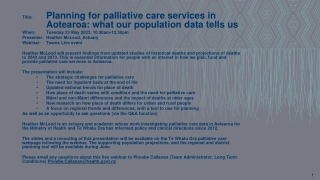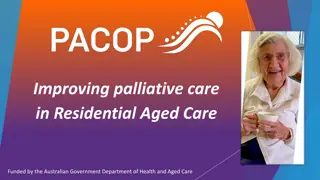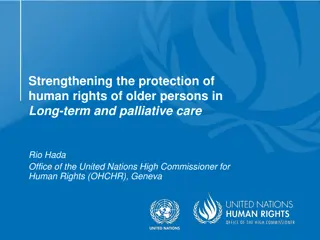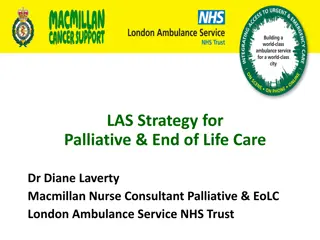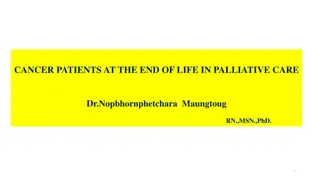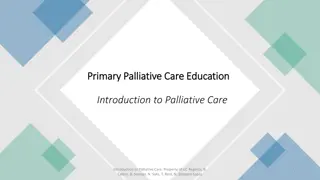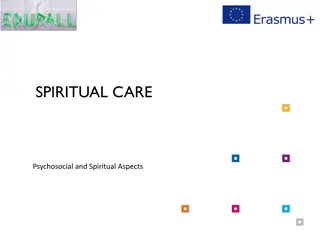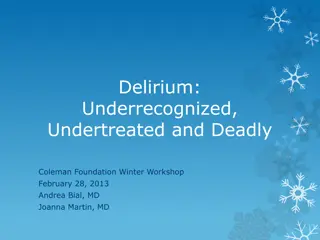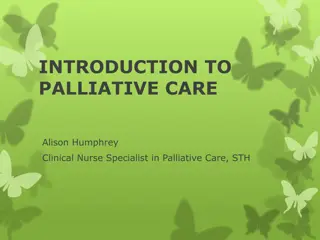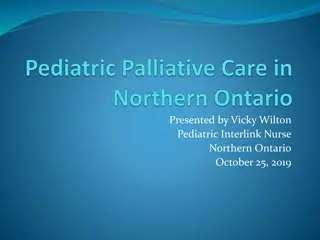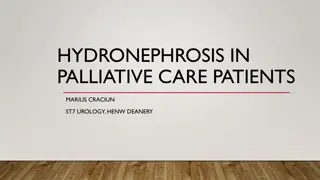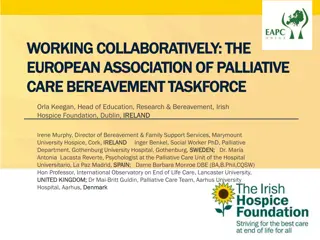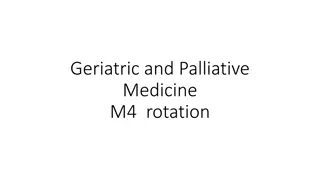Understanding Palliative Day Care Services
Palliative Day Care offers specialized care for patients with life-limiting illnesses, providing support and services to meet their needs while maintaining a link with primary caregivers. The service includes close monitoring, medical-social care, psychological support, and opportunities for social interaction, allowing patients to stay in their own homes and feel a sense of normalcy. It also involves a nurse-led team working closely with GPs and the multidisciplinary team to ensure holistic care for patients and families.
Download Presentation

Please find below an Image/Link to download the presentation.
The content on the website is provided AS IS for your information and personal use only. It may not be sold, licensed, or shared on other websites without obtaining consent from the author. Download presentation by click this link. If you encounter any issues during the download, it is possible that the publisher has removed the file from their server.
E N D
Presentation Transcript
Be able to identify the role and function of Palliative Day Care Be able to identify the services provided by the specialist palliative day unit Gain an understanding of the role of the Nurse Be able to recognise the importance of communication & partnership between patient, family, MDT and outside services Will gain an understanding of how to access the service
Palliative care is the total care of patients and their families, at a time when the medical expectation is no longer curative Palliative Day Care provides individualised care to meet the patients needs and preferences; It allows access to the specialist Palliative care team while maintaining a vital link with the primary carers
Established in St Luke's Hospice, Sheffield, 1975. Providing a day out for the patient and day off for the carer Opportunity to build relationships with patient and family Marymount Day unit opened in September 1994 St Lukes s Palliative Day Care opened in September 2011 Has evolved to be a very busy unit, using the medical-social model
Close monitoring of patients over 4-5hrs, without need for admission to a hospice bed Review by specialist palliative medical team Formulates a link between GP and Palliative care team Allows other members of the MDT to be involved directly Introduces the hospice to the patient Assists a person to stay in their own home Supportive & psychological care to patient & family Personal care needs Allows respite for families or carers Allows a person to feel normal in their illness Social interaction opportunity to access creative arts or other activities to enhance quality if life
The service is available to patients with malignant and non malignant life limiting diseases Medical-social model of care Nurse led service Input on a daily basis from specialist palliative care medical team Some patients short-term attendance(reassessed every 6-8 weeks) GP remains the primary carer Work closely with GP, PHN Supported by the MDT and Volunteers
Full nursing assessment using ESAS form and individual care planned Medical review , as required Access to physiotherapy, social work, chaplaincy, complementary therapies Personal care needs- jacuzzi bath, shower, hairdresser, chiropodist, beauty therapy, hand & nail care, wound care, art Full 3 course lunch and snacks Availability of Mass Family bring in /hospital bus / volunteer drivers
10.00- 11.00 Patients collected by hospital bus 11.00- 11.30 Tea/ coffee and scones and chat 11.30- 13.00-Nursing Assessments, Jacuzzis, hairdressing, hand and nails, complementary therapies 13.00-13.45 Lunch Medical Review 13.45- 15.30 Planned activity eg art class, meditation, crafts, indoor gardening, music 15.30 Home Open Monday Thursday 7-10 patients/day
Welcoming role Assessment and identification of patient needs and overall coordination of care Liaison with MDT ,GP ,PHN, Community Pharmacy to optimise symptom management Communication with the family/ relatives Supportive role offering emotional & psychological support and time to listen Family meetings Multidisciplinary team meetings Assisting with Activities of Daily Living Supervision of students Support to volunteers
Vital part of day care. Important to form a trusting relationship with the patient and family Enhances care and support Building good relationships with other services will allow a more seamless care package
Referral from Hospital Consultant or GP to Palliative Care Service Clinical Nurse Specialist from Community Palliative Care visits patient at home and assesses suitability for Palliative Service CNS identifies patients for Palliative Day Care and refers on Referrals from Inpatient Unit Day Care registered nurse makes contact with person to organise suitable day to attend and mode of transport
1. A new approach to eliciting patients preferences for palliative day care: the choice experiment method.(includes abstract); Douglas H; Normand CE; Higginson IJ; Goodwin DM; Journal of Pain & Symptom Management, 2005 May; 29 (5): 435-45 (journal article equations & formulas, research, tables/charts) ISSN: 0885-3924 PMID: 15904746 CINAHL AN: 2009106227. 2. Social objectives in cancer care: the example of palliative day care. (includes abstract); Payne M; European Journal of Cancer Care, 2006 Dec; 15 (5): 440-7 (journal article research, systematic review, tables/charts) ISSN: 0961-5423 PMID: 17177900 CINAHL AN: 2009372820. 3. The role of palliative day care in supporting patients: a therapeutic community space.(includes abstract); Fisher C; O Connor M; Abel K; International Journal of Palliative Nursing, 2008 Mar; 14 (3): 117-25 (journal article research) ISSN 1357-6321 PMID 18414335 CINAHL AN: 2009900337. 4. Coping with Terminal Illness: The Experience of Attending Specialist Palliative Day Care.(includes abstract); Bradley SE; Frizelle D; Johnson M; Journal of Palliative Medicine, 2010 Oct; 13 (10): 1211-8 (journal article - research) ISSN: 1096-6218 CINAHL AN: 2010828069.
5. Providing palliative day care for non-malignant conditions.(includes abstract); Cochrane E; Colville E; Conway R; Nursing Times, 2008 Nov 11-17; 104 (45): 32- 5 (journal article research, tables/charts) ISSN: 0954- 7762 PMID: 19051687 CINAHL AN:2010122916. 6. Palliative day care: A qualitative study of service users experiences in the United Kingdom. (includes abstract); Hyde, Val; Skirton, Heather; Richardson, Janet; Nursing & Health Sciences, 2011 Jun; 13 (2): 178-83 (journal article research) ISSN: 1441-0745 PMID: 21595812 CINAHL AN: 2011065349. 7. Palliative day care -- a study of well-being and health- related quality of life. (includes abstract); Sviden GA; Furst CJ; von Koch L; Borell L; Palliative Medicine, 2009 Jul; 23 (5): 441-7 (journal article research, tables/charts) ISSN: 0269-2163 PMIDL 19351795 CINAHL AN: 2010358280.


